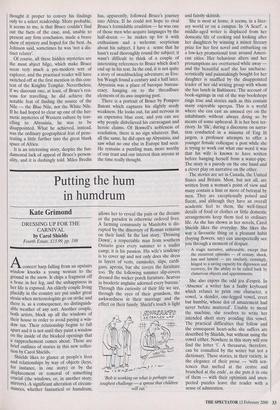Putting the hum in humdrum
Kate Grimond
DRESSING UP FOR THE CARNIVAL by Carol Shields Fourth Estate, £13.99, pp. 198 Aconcert harp falling from an upstairs window knocks a young woman to the ground in the snow. It chips a fragment off a bone in her leg, and the unhappiness in her life is exposed. An elderly couple living placidly in the country are put under great strain when meteorologists go on strike and there is, as a consequence, no distinguish- able weather of any sort. Another couple, both artists, block up all the windows of their house in order to avoid paying a win- dow tax. Their relationship begins to fall apart and it is not until they paint a window on the inside of the blocked openings that a rapprochement comes about. These are brief outlines of stories in this new collec- tion by Carol Shields.
Shields likes to glance at people's lives and relationships by way of objects (keys, for instance, in one story) or by the displacement or removal of something crucial (the windows, or, in another story, mirrors). A significant alteration of circum- stances, whether fantastical or humdrum, allows her to reveal the pain or the dreams or the paradox in otherwise ordered lives. A farming community in Manitoba is dis- rupted by the discovery of Roman remains on their land. In the last story, 'Dressing Down', a respectable man from southern Ontario goes every summer to a nudist camp; it is his passion. His wife's tendency is to cover up and not only does she dress in layers of vests, camisoles, slips, cardi- gans, aprons, but she covers the furniture too. 'By the following summer slip-covers dressed the wicker porch furniture. Scarves in broderie anglaise adorned every bureau.' Through this curiosity of their life we see, through the eyes of their grandson, the awkwardness in their marriage and the effect on their family. Shield's touch is light `Bob is working on what is perhaps our toughest challenge — a sprout that children will eat.' and faintly skittish.
She is most at home, it seems, in a liter- ary world or on a campus. In 'A Scarf', a middle-aged writer is displaced from her domestic life of cooking and looking after her daughters by winning a minor literary prize for her first novel and embarking on a low-key promotional tour around Ameri- can cities. Her behaviour alters and her presumptions are overturned while away and the beautiful scarf she has uncharac- teristically and painstakingly bought for her daughter is snaffled by the disappointed leader of her old writing group with whom she has lunch in Baltimore. The account of book-signings in out of the way bookshops rings true and stories such as this contain many enjoyable apercus. This is a world where she can cast an amused eye on the inhabitants without always doing so by means of some upheaval. It is her best ter- ritory. In 'Ilk', during a discourse on narra- tion conducted in a miasma of Eng lit jargon, a professor attempts to offer a younger female colleague a post while she is trying to work out what one word it was that his wife is known to have written before hanging herself from a water-pipe. The story is a parody on the one hand and a clever play on narrative on the other.
The stories are set in Canada, the United States and Britain. Most, but not all, are written from a woman's point of view and many contain a hint or more of betrayal by men. They are exceptionally poised and fluent, and although they have an overall academic feel to them, the well-timed details of food or clothes or little domestic arrangements keep them tied to ordinary life. As she has shown in her novels, Carol Shields likes the everyday. She likes the way a favourite thing or a pleasant habit (buying flowers, say) can unexpectedly see you through a moment of despair.
A tragic narrative, unbearable, except that the recurrent episodes — of ecstasy, shock, loss and lament — are similarly, cunningly, hinged to a saving capacity for digression and recovery, for the ability to be called back by clamorous objects and appointments.
She also enjoys the odd jeu d'esprit. In `Absence' a writer has a faulty keyboard which refuses to print one character, a vowel, 'a slender, one-legged vowel, erect but humble, whose dot of amazement had never before mattered'. Unable to mend the machine, she resolves to write her intended short story avoiding this vowel. The practical difficulties that follow and the consequent heart-ache she suffers are described by Shields, but without using the vowel either. Nowhere in this story will you find the letter T. A thesaurus, therefore, can be consulted by the writer but not a dictionary. These stories, in their variety, in the elegance of their prose — 'with sen- tences that melted at the centre and branched at the ends', as she puts it in one of them — with their optimism and unex- pected puzzles leave the reader with a sense of admiration.


































































 Previous page
Previous page